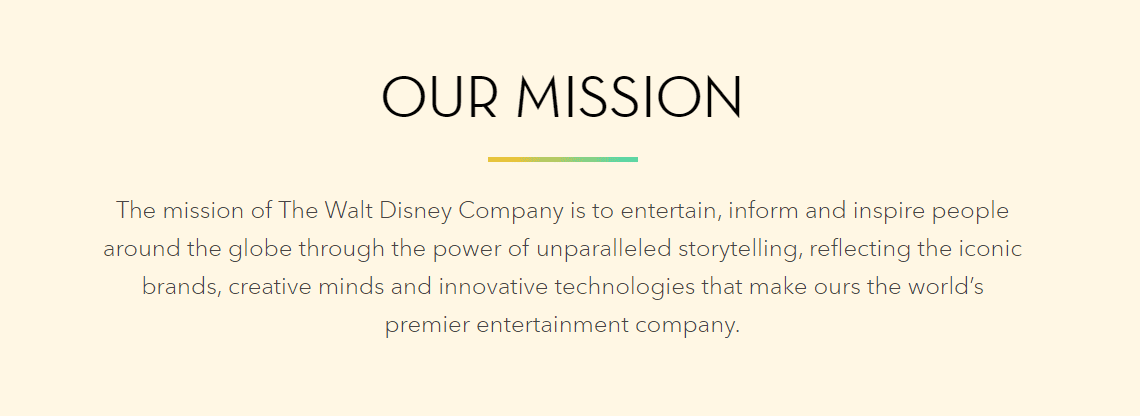Cultivating Corporate Culture: The Role of Company Values

Anthony Cotter
Creative Director
September 21 2023

What does your company really stand for? As a business leader, do you have an effective, compact way to answer that question?
A strong set of company values can fill this need – and deliver so many more powerful competitive advantages to your business. Here’s what you need to know.
What are company values?
Company values are also sometimes known as core values because they define what beliefs are at the core of a company’s strategy.
They are the forces at the heart of a business’s decision-making. In a value-driven organization, important choices should always be made with these principles in mind.
In the 1990s, business experts began talking about core company values in books like Built to Last and Requisite Organization. The idea conveyed in these works is that values are a system of beliefs and norms which help guide an organization’s culture.
Defining a set of values in writing solidifies them for everyone in the company, making sure all stakeholders are on the same page.
Why strong company values are essential to company culture
Many businesses create a list of company core values at some point, but not all businesses that do so are truly value-driven.
One infamous example is Enron, an energy company whose corporate values were “respect, integrity, communication, and excellence.” Considering that they were at the center of an infamous accounting fraud scandal in the early 2000s, it’s safe to say that Enron didn’t stick to its values.
Adhering to a cohesive set of company values delivers at least five powerful benefits to businesses, which we’ll explore below.
Defines purpose and direction
First, company values act as a compass, directing every decision and action within the organization and providing clarity for what the company stands for, its mission, and its long-term vision.
Of course, a corporation doesn’t believe in anything on its own. Strong, savvy leaders set the tone in a business by exemplifying its company values on an everyday basis.
Creates a clear sense of unity and teamwork
Shared values also create a collective identity, promoting a sense of belonging among employees. When everyone understands that they are pushing forward toward a shared goal, increased unity and teamwork are inevitable results.
Values can also play a role in reducing internal conflicts and enhancing collaboration for much the same reason. At some level, the right direction to go is embedded in these values. And because everyone can operate with a shared understanding, you’ll typically see a reduction in internal conflicts.
Workvivo’s social intranet is a great way to create – and then nurture – this sense of company identity and unity. See how Workvivo delivers results.
Differentiates the company’s organizational culture
Company values are important because ideally they should describe not what a corporation thinks it should believe in, but what it actually believes in. In this way, values give a unique character or flavor to a company and can be a differentiating factor from competitors.
When they’re properly implemented in a company, corporate values can drive employee engagement. Many employees place a very high importance on values and culture.
In fact, a Glassdoor survey showed that nearly 80% of respondents would consider a company’s mission and purpose before applying for a job, and over half said that “company culture is more important than salary when it comes to job satisfaction.”
Unique values make a difference internally, but they also play a role in shaping an organization’s public or external image. Many of the world’s biggest brands are known for specific values: REI, Starbucks, and Ben & Jerry’s are just a few examples.
Helps with employee recruitment and retention
Clear organizational values can also help recruit and retain right-fit employees. When those values are also visible, it’s easier to attract individuals who resonate with your beliefs, leading to better:
- Job fit
- Employee retention
- Employee satisfaction
Hiring better-fit employees has numerous effects: those who come to your company because they believe in it will automatically start out with a higher level of employee engagement, motivation, and loyalty.
Supports ethical behavior and decision-making
A company’s values serve as a moral framework as well, guiding employees in situations where the right course of action isn’t immediately evident.
Google’s infamous (and now extinct) mantra of ‘Don’t be evil’ was a good example (at least until it wasn’t). When there was a key decision to make, the ‘Don’t be evil’ motto instantly eliminated many possible courses of action.
In an age where long-term reputation and consumer trust-building are front and center, having values rooted in ethics and integrity is key.
5 real-life examples of company values
The companies mentioned below are some of the largest in the world, and all are represented in the Fortune 500. Here are some key observations about their values.
1. Nike
Nike’s mission statement is clear, bold, and directly related to its core product offering:

While Nike’s company values are not explicitly mentioned on their website, Business Strategy Hub lists them as ‘community’, ‘sustainability’, ‘diversity’ and ‘social responsibility’.
We can see evidence of a commitment to each of these core values directly from Nike.
Community
Nike has a section on its website devoted to community initiatives.

They show their commitment to the community through their Made to Play program and investment in girls’ coaching.
Sustainability
Another of Nike’s company values is sustainability. This is shown by its commitment to protecting the environment, corporate sustainability initiatives, and recycling and clean energy programs.

Diversity
Diversity and equality are also important guarantees from Nike, as shown by its corporate inclusion initiatives and grants for projects that promote diversity.

Social Responsibility
Finally, Nike commits to its value of social responsibility with the above programs, plus its guidelines for responsible sourcing.
2. Apple
On its website, Apple lists some company values that are similar to Nike’s, including inclusion, supplier responsibility, and protecting the environment.

However, Apple’s original values from 1981 set a slightly different tone. Check out the list below:
- One person, one computer.
- We are going for it and we will set aggressive goals.
- We are all on the adventure together.
- We build products we believe in.
- We are here to make a positive difference in society, as well as make a profit.
- Each person is important; each has the opportunity and the obligation to make a difference.
- We are all in it together, win or lose.
- We are enthusiastic!
- We are creative; we set the pace.
- We want everyone to enjoy the adventure we are on together.
- We care about what we do.
- We want to create an environment in which Apple values flourish.
Notice the difference?
The earlier values take a more conversational tone. They also included priorities such as ‘setting aggressive goals’ and being ‘all on the adventure together’, which were geared towards the needs of a growing startup.
As Apple expanded, its values evolved to reflect the responsibilities of a larger corporation.
3. Disney
Like Nike, Disney’s mission statement is closely linked to its specific industry and target audience.

According to Disney Careers, their company values are optimism, innovation, decency, quality, community, and storytelling.
As you can see, these are far from generic. They’re very specific to the Disney brand.
Creating a positive tone is important in a company known for its entertainment products, animation, and theme parks. Decency is important when creating products for children, and storytelling is a key part of Disney’s mission.
Disney has a long history of innovation (thanks to its legion of imagineers and other industry pioneers) and is an expert at creating a sense of community. While we could argue about the merits of any particular show or movie, there’s no denying that Disney in general stands for quality.
4. Airbnb
Airbnb offers a set of core values that are quirkier than most – and hard work to understand at first glance. But they still speak volumes about the company.
The four core values are:
- Champion the mission (united with our community to create a world where anyone can belong anywhere).
- Be a host (caring, open, and encouraging to everyone we work with).
- Embrace the adventure (driven by curiosity, optimism, and the belief that every person can grow).
- Be a cereal [yes, as in breakfast cereal] entrepreneur (determined and creative in transforming bold ambitions into reality).
At first, you might mistake the organization’s core values as being guiding principles they’re looking for in their hosts and guides, not their employees. But think a little longer and it becomes clear: the company is built around those core values for everyone.
You can see them in the whimsy and sense of adventure in its consumer product, as well as how they continue to innovate and enter new experimental markets.
5. Lululemon
Yoga-inspired technical athletic apparel maker Lululemon embraces a set of core values that include personal responsibility, entrepreneurship, honesty, courage, connection, fun, and inclusion.
It’s easy to see the ways the brand promotes fun, connection, and inclusion – simply walk into any store. It’s not hard to imagine how values like personal responsibility, honesty, and courage might color day-to-day interactions between office staffers.
How to create and implement your own company values
Now that we’ve talked about how to choose company values, and have seen some examples from successful businesses, the next thing you may be thinking is, “How can I make sure my values really work?”
Developing your own company values takes time, energy, and careful thought, but the examples we’ve looked at here can give us some answers.
Reflect on your company’s mission statement (and vision)
Most businesses don’t start from scratch on their company values. Instead, they begin with a mission statement and vision statement. Usually those foundational elements already contain values or, at the least, suggest what might underlie the mission and vision.
Starting here will help keep you focused on the bigger picture and your organization’s long-term goals as you craft company values.
Involve other team members and stakeholders
Involving others in the process yields stronger results; inclusivity and diversity of thought helps your organization craft a set of values that truly represents the people that make up the company.
When more stakeholders from diverse viewpoints are involved in the process, you’ll gain stronger buy-in and collective ownership of values.
You can use formal and informal processes to do this: even relatively simple initiatives like employee surveys or focus groups can deliver meaningful insights.
Keep it genuine and authentic
Make sure the values you choose are legitimate and authentic to your brand. This isn’t the place to create your moonshot version of what you wish the company were; it’s where to say what your company is (and is realistically striving toward).
For example, a business with a legacy of pollution and environmental destruction could say one of its core values is responsible, eco-friendly practices. But if reality says otherwise, the company will suffer both in its public image and among its workforce.
In contrast, go back to the examples we shared earlier. Those values all make intrinsic sense for those brands. And that alignment keeps people moving forward together.
Define each value clearly
You’ll also want to make sure your values are clear and easy to understand. Leave no room for confusion by using precise language.
Look back at Airbnb’s core values. They are short and catchy, but a little hard to understand. That’s why the company gave a clarifying statement for each. They wanted to keep the memorability of those short phrases while also adding plenty of clarity.
Other organizations use single words for their core values, which can work well. Try to avoid business-speak or buzzwords (unless they truly are the best options for describing your culture and values).
The key thing is to make sure everyone in the organization understands:
- What the values are
- Why they are important
- In what concrete ways they can commit to them
Most companies should simplify to just a handful of core values as well. There’s no perfect number of values to have, but experts suggest somewhere close to three. In the tech and SaaS space, Hotjar recommends having between three and ten core values.
Integrate the values into your status quo
It’s one thing to craft a strong set of values, but some organizations struggle with how to promote them in day-to-day operations.
This can be done in numerous ways. Like Netflix, you can hire for company culture and seek out only people who are already committed to your values. You can also change your processes, make sure leadership and team members are communicating, and improve the tone of your internal communications.
Take a look at your daily processes and events: meetings, company rituals, and so forth. Odds are you’ll identify ways to adjust those processes and workflows to better reflect your company values.
Training programs and knowledge sharing tools can be a big help here, including Workvivo, which makes it easy to embed company values throughout the employee experience.
Ensure leaders lead by example
Leadership plays a vital role in setting the tone for value adherence. When there’s a disconnect between what leadership does and what the company says it values, public perception and internal engagement both suffer.
Review and revise your values statement as needed
Companies change over time, and it’s okay if values do, too. Remember Apple, one of the most successful tech companies of all time: its values from the 1980s were good, but they don’t all fit the way the company looks and operates over 40 years later.
If your brand undergoes a significant change in market or structure, merger or acquisition, or shift in business model, it might be time to review your formal company values.
Workvivo makes it easy to gather internal feedback on the continued relevance and effectiveness of current values using its powerful workplace insights capabilities.
Make your corporate values shine through with Workvivo
Having a clear set of authentic company values is key to having a successful company. It’s a central piece of creating a strong culture and brand image, and it’s a driving force behind keeping workers pushing together toward common goals.
Making sure your values are being followed is all about clear communication.
Workvivo helps you shine a light on all the positive things happening in the organization and bring goals and values alive.
Workvivo is a new breed of corporate intranet, an employee communication platform created for the future global office. It helps companies engage, inspire, motivate, recognize, and update their employees, wherever they are and in ways that traditional tools simply can’t.
Ready to see for yourself? Request your Workvivo demo now!